Update
MOSSEL BAY NEWS - The Garden Route SPCA (GRSPCA) has said its inspectors were "devastated" by what they saw at Harry Giddey Park, which included dead birds in nests, a dead tortoise and the decomposing remains of two other tortoises.
Mossel Bay Advertiser visited the park on Friday, 8 November, where it found the remains of a tortoise in one of the enclosures.
GRSPCA area manager Cheri Cooke said the organisation went to conduct a full inspection of all the animals in the park after it received a complaint about the conditions of the tortoises at the park in September.
Cooke said GRSPCA staff found some of the tortoises had "ocular and nasal discharge, swollen eyelids, difficulty breathing and were emaciated; some were dehydrated".
She said inspectors removed all the tortoises from the park to have them assessed.
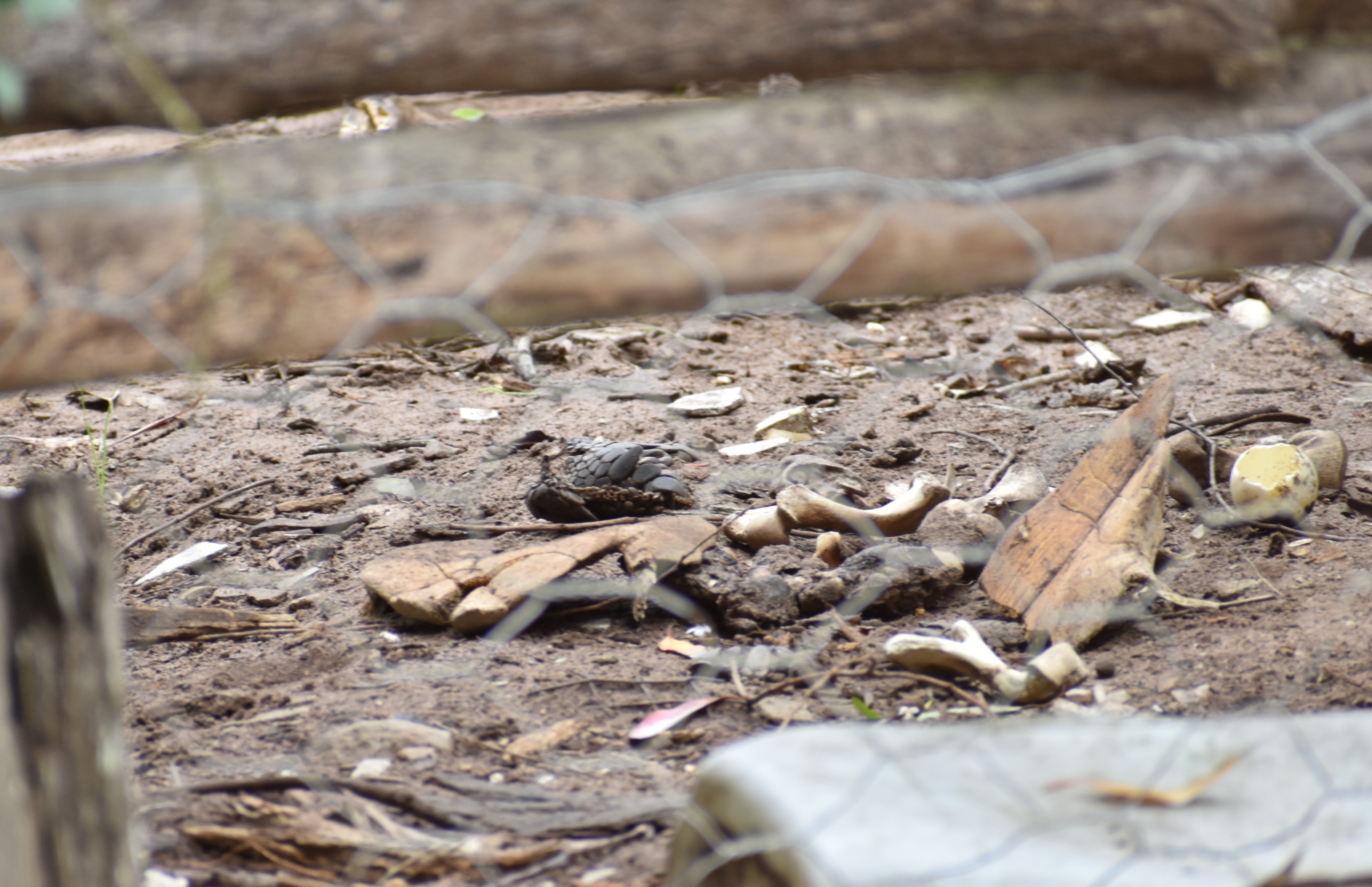
The Wildlife Crime Information Network's Leon Rossouw, who was at the park on 8 October when the tortoises were handed over to the GRSPCA, said he too found some tortoises had runny noses and watery eyes.
He said he found a dead leopard tortoise in one of the enclosures, in an advanced stage of decomposition.
Grave concern
Cooke said the welfare of the birds was also "of grave concern". It was found they were being fed on the floor.
The old food had not been cleared away and was 10cm thick in some cages.
She said dead birds were in nests, and some carcasses between the cage bars and on the floor were decaying. Many of the birds had poor feather quality and protruding chest bones – a sign of muscle atrophy and emaciation.
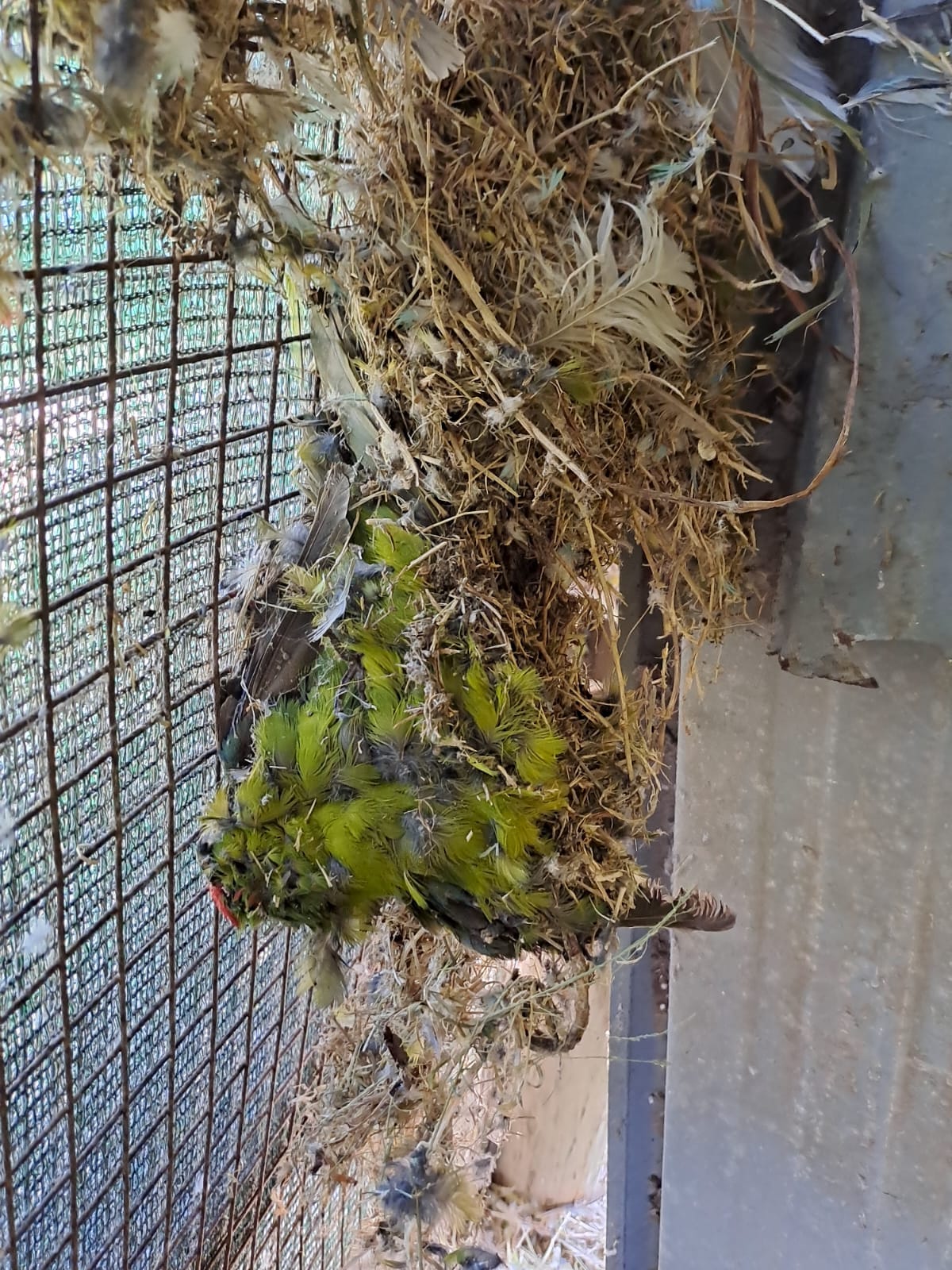 The carcase of a bird in one of the aviaries at Harry Giddey Park. Photo: Garden Route SPCA
The carcase of a bird in one of the aviaries at Harry Giddey Park. Photo: Garden Route SPCA
Cooke said that when animals are housed in captivity "in less than adequate conditions, the spread of contagious diseases is rampant".
The GRSPCA's vet conducted in-depth diagnostic tests on both the tortoises and the birds, she noted.
Disease
"The tortoises were found to be suffering from a severe worm infestation, as well as the highly contagious mycoplasma/herpes infection."
In eight out of the nine aviaries at the park, the deadly and highly contagious psittacine beak and feather disease (PBFD) was found. There is no cure and she said those infected die slowly and painfully.
The GRSPCA's veterinarian had to make the decision to euthanise the affected animals.
The Hartenbos Animal Hospital's Dr Frans de Graaff said that while he was not involved in the handover and testing of the animals at the park, he had spoken to the vet who was. He said he would have likely made the same decision to euthanise the affected animals.
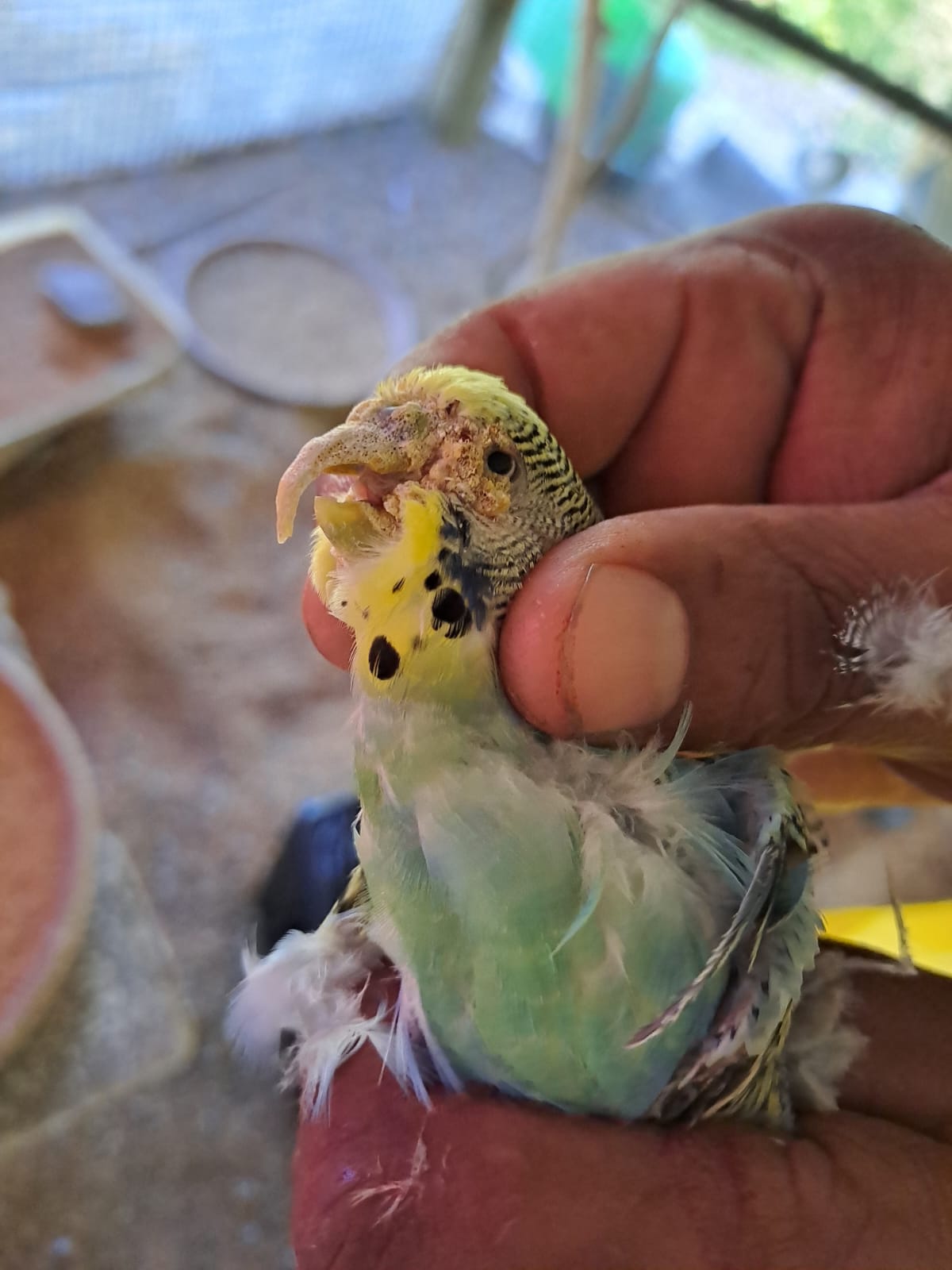 A bird from Harry Giddey Park with scaly-face mites. Photo: Garden Route SPCA
A bird from Harry Giddey Park with scaly-face mites. Photo: Garden Route SPCA
De Graaff said the mycoplasma and herpes virus infection was probably introduced into the park tortoise population by someone who dumped a tortoise there. He said it is highly contagious and one cannot rehabilitate or release carriers of the disease back into the wild. He added that infected tortoises can take a very long time to die from the disease.
Difficult situation
He said with regards to the birds that tested positive for PBFD, he realised it was a difficult situation and said it "wipes out birds".
Cooke added that the GRSPCA had been mindful of the "difficult situation faced by the municipality" and said municipal officials are conducting an internal investigation.
She said due to the serious nature of the offences, the GRSPCA had "not been at liberty to publicise the findings earlier".
Cooke added the GRSPCA is confident the municipality will take the necessary action against those responsible "for the tragedy".
She said the GRSPCA was often blamed for making "difficult decisions our staff have to face on a daily basis".
Cooke noted: "We do not create the problems, however we are always left to pick up the pieces. We assure our community that we will never make decisions without consulting specialists who have expert knowledge of the species we are dealing with in any situation.
"We cannot continue our work without the support of our community. Thank you to those who support us," she said.
See the SPCA's full response below:
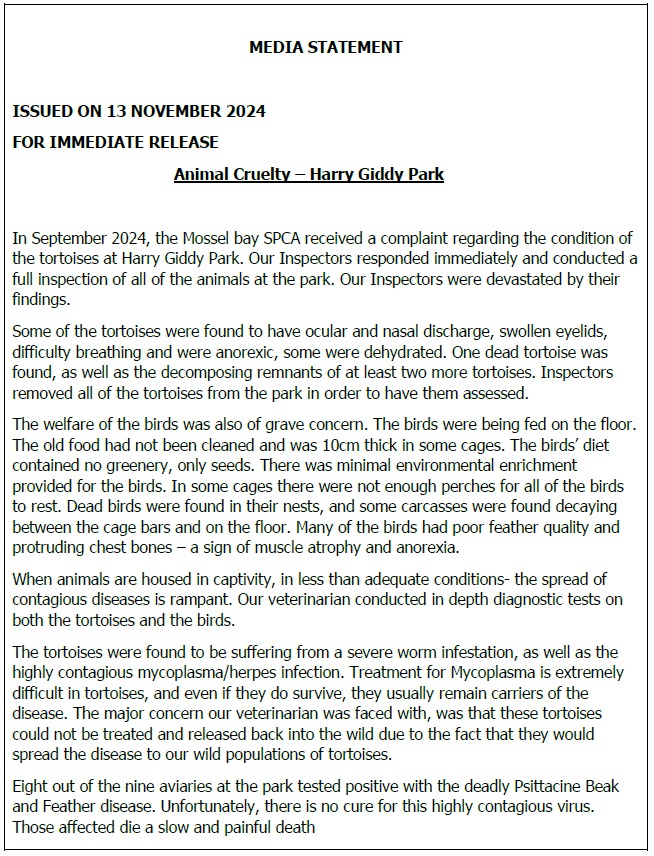
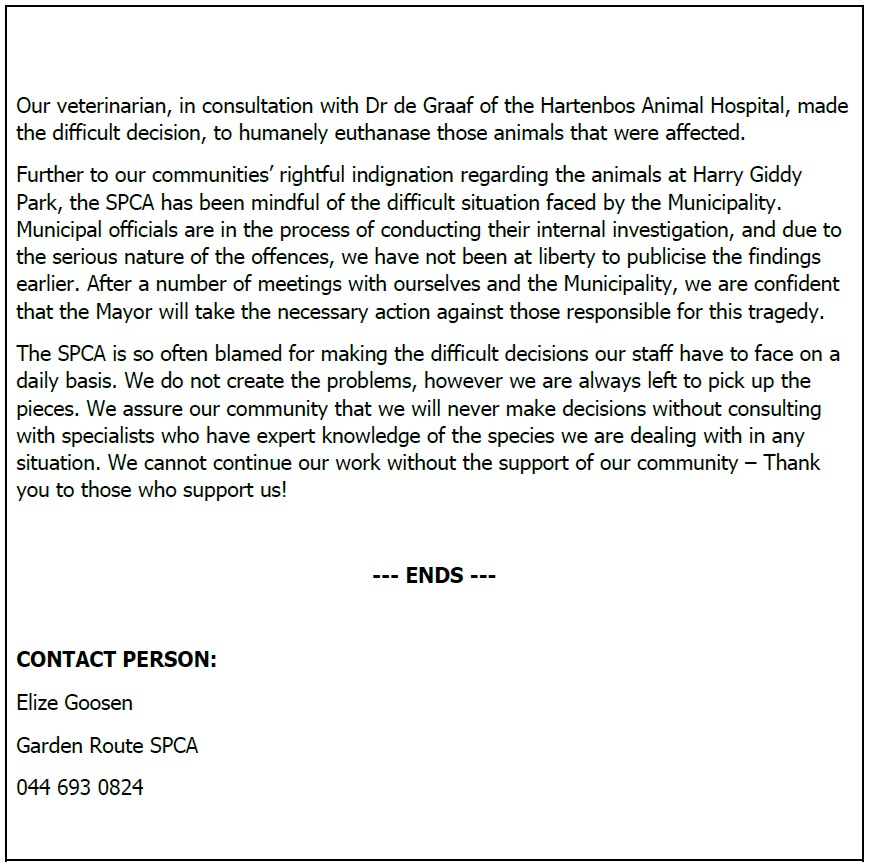
The municipality notes in a statement that a complete investigation has been ordered. "A full statement will follow and the public will be informed once the investigation is completed."
See the municipality's full response below:
 The full response by the Mossel Bay Municipality.
The full response by the Mossel Bay Municipality.
Mossel Bay mayor Dirk Kotzé says he has seen the SPCA's report on the park's animal enclosures.
He says council remains resolute in its approach that the municipal manager and municipal administration be mandated to conduct a comprehensive investigation into the claims outlined in the SPCA report and, if so advised, promptly take the required administrative and/or disciplinary actions.
Kotzé thanked the SPCA "for its swift response to concerns raised by municipal personnel and residents, further reasserting council's commitment to ensuring proper oversight of the municipality's efforts to enhance environmental conservation in Mossel Bay".
See his full response below:
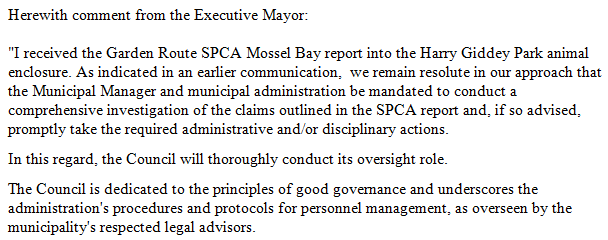
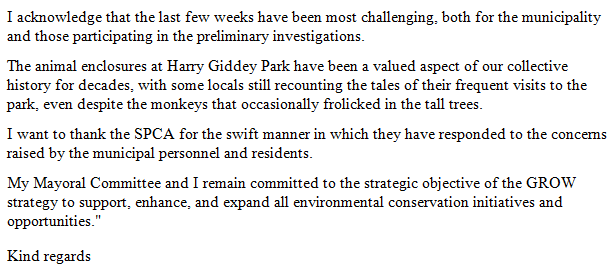 The full response by the Mossel Bay Municipality's executive mayor, Dirk Kotzé.
The full response by the Mossel Bay Municipality's executive mayor, Dirk Kotzé.
Previous articles:
- CapeNature last inspected park in 2021
- Harry Giddey Park birds removed, some euthanised
- Park tortoises had 'respiratory tract disease'
- CapeNature to follow up on expired captivity permit
- Motion brought in council about Harry Giddey Park
- Park tortoises euthanised
‘We bring you the latest Garden Route, Hessequa, Karoo news’















